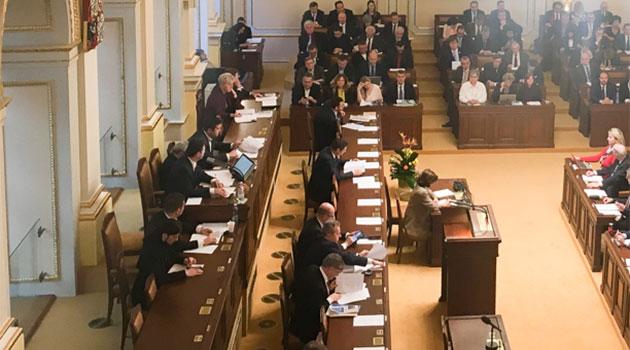Czech Justice Minister and lawmakers clash over proposed changes to collections proceedings

Czech Justice Minister Marie Benešová (ANO) does not like the changes to a bill on collections proceedings regulations that were suggested in September by the Constitutional Law Committee in the lower house. The Committee rejected the bill’s proposal to introduce local jurisdictions for collections agents, and also rejected a proposal to enact an impartial method for consolidating debt so that a debtor would handle all such claims with one selected collections agent.
Last week the lower house was scheduled to review the Committee’s changes during a second reading of the bill. The final legislation could also include the idea of creditors making down payments on the cost of debt enforcement, or the idea of halting some collections proceedings that have long proved fruitless without creditors’ consent, as well as ideas on how to settle older debts.
The Justice Minister is not convinced of the merit of the proposed changes and is considering withdrawing the entire bill if the amendments proposed to it become too extreme. Committee members recommended removing a crucial component of her draft legislation, and that is the principle of one debtor-one collections agent.
“I do not like the fact that the consolidation of collections proceedings was abandoned, the Government’s program declaration pledged to achieve that,” the Justice Minister told the Deník N newspaper. The bill amending collections proceedings regulations could provide relief to hundreds of thousands of people if adopted.
The draft legislation did not make it through the Constitutional Law Commitee unchanged in September, however. Lawmakers from the ANO movement and the Civic Democratic Party (ODS) cast the deciding votes.
The ANO members of the Committee basically opposed their own minister’s bill. In June, Czech Prime Minister Andrej Babiš promised to introduce the principle of territoriality for collections proceedings to address the so-called “snowball effect”, an apt name for situations in which a debtor becomes involved in one collections proceedings after another.
“The snowball effect and territoriality are two principles that are correct at their core, but we must get the best out of them, put them together correctly and craft the kind of legislation that will prevent debtors from being exploited while simultaneously protecting creditors,” the PM posted to Facebook. However, after reviewing the bill in September, the Committee members removed the idea of closing fruitless collections proceedings, as well as the idea of reimbursing the costs of proceedings to debtors who are also employers.
Instead, the MPs on the Committee significantly altered the bill to favor collections agents. They recommended adopting a proposal by Czech MP Patrik Nacher (ANO) that would make it possible for collections agents to receive across-the-board reimbursement from the state for closing proceedings if they fail to secure payments after several years.
That idea would cost the state between 130 million and 260 million crowns [EUR 4.77 million – EUR 9.54 million]. The original bill submitted by the Justice Minister counted on halting fruitless proceedings, but did not envision the state paying collections agents to do so.
The Pirate Party has long warned of the issue of the current collections system. “Adopting the bill as it was first proposed would mean in practice that each debtor would have just one collections agent, located near his or her residence. Then we would avoid scenarios where the debtor lives in Prague while the collections agent is located in Ústí nad Labem or Přerov. Should the debtor incur more debt, the collections agent in charge of the exisitng debt would automatically handle the new collections. That is logical and it would result in limiting overcharging on the amount owed. Unfortunately, the existing practice is that debtors address each debt with a different collections agent [who charges differently],” Cyril Koky, who recently made a failed bid for the Senate on the Pirates’ ticket, told news server Romea.cz.
Koky pointed out that the bill contains hundreds of other changes of both major and minor significance, such as cancelling restrictions on debtors accessing their bank accounts and cancelling charges for the postponement of collections. The bill would also significantly influence the situations of debtors who end up in collections as a consequence of negative macroeconomic trends.
The Justice Minister admitted openly to Deník N last month that she was also considering a radical step that could absolutely bury the years of work done on the bill. “If it appears to be the case that, because of lawmakers’ proposals, the bill significantly deviates from the original reason the Justice Ministry submitted this draft legislation, I would take advantage of the opportunity to pull the emergency brake by withdrawing the bill from consideration in the Chamber of Deputies,” she said.
